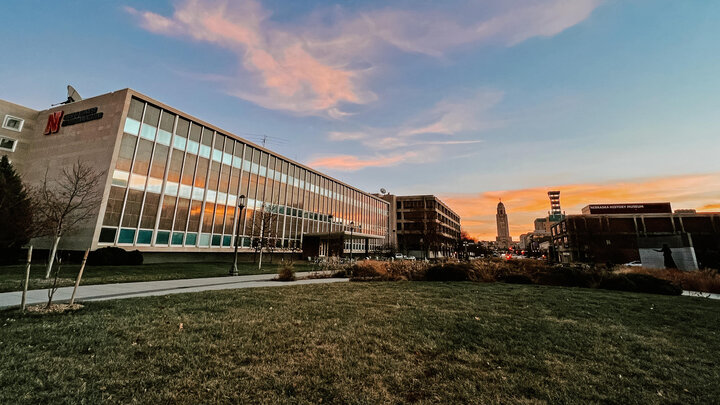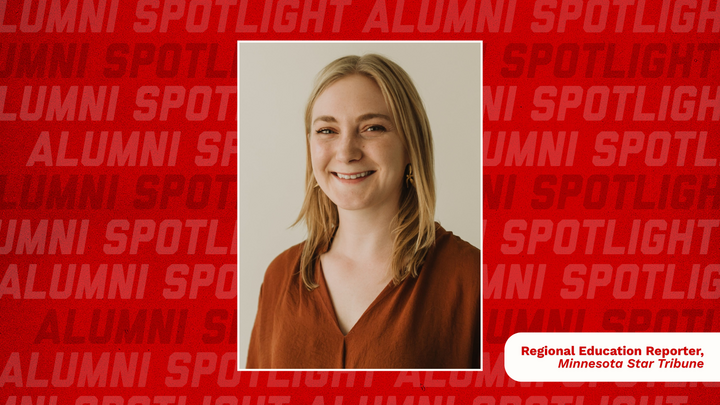The Donald and Lorena Meier Foundation of Chicago has pledged $755,000 to the University of Nebraska–Lincoln’s College of Journalism and Mass Communications to support construction of a new television studio and newsroom.
“This generous gift gives students the chance to learn, experiment and build a portfolio of their work with the latest broadcast production technology,” said Shari Veil, dean of the College of Journalism and Mass Communications. “The Meier legacy will continue on through the students who use the Don and Lorena Meier Studio to prepare themselves for a future in media.”
The gift will replace an existing studio in Andersen Hall and transform almost the entire second floor into a newsroom, control area and seperate news, interview and virtual sets. The studio will incorporate cutting-edge technology that supports live broadcasts or one-person productions.
Bob Bennett, Meier Foundation Board Member and nephew of Don and Lorena Meier, explained how the project aligns with Don and Lorena’s understanding of the need for hands on learning. “Don would advise students to gain as much experience as they can,” said Bennet. “That’s how he learned about television. There weren’t schools teaching it at that time. He learned through experience.”
The Meier Foundation is also making a major gift to the University of Nebraska Foundation to create four endowed student scholarship funds and to expand and permanently endow 14 existing scholarship funds. The scholarships will benefit students across the University of Nebraska system who meet the criteria.
A 1941 Husker alumnus, the late Donald “Don” Meier used estate planning to direct assets from his charitable foundation to provide significant support for the University of Nebraska. During their lives, Meier and his wife, Lorena, gave regularly to the university and established their first scholarship fund in 1999.
“The generous support from Donald and Lorena Meier — during their lives and through planned giving — will help make the university even more accessible and affordable for thousands of students,” Chancellor Ronnie Green said. “Support for a new, state-of-the-art TV studio and newsroom will also offer a truly professional experience for journalism students.
“The philanthropic mark made by Don and Lorena on our students and the entire University of Nebraska system will continue for generations,” Green added.
University of Nebraska Foundation Senior Vice President and General Counsel Keith Miles first met Meier in 2006 when he set up a number of plans to fund scholarships at the University.
Miles met with Meier and David Shoub, who at the time had been Meier’s lawyer, regularly to comb through each scholarship and make changes as needed. Miles recalled that Meier was very meticulous when reviewing agreements because he was so focused on wanting to help students.
“The first thing Don would say when anyone came to him with a proposal was ‘How will this impact students?’ and if that project didn’t directly support students he wasn’t interested,” Miles said. “That’s why this television studio project is ideal because this gives students hands-on learning opportunities.”
Don and Lorena Meier had distinguished television careers. This included the iconic and award-winning "Mutual of Omaha’s Wild Kingdom” television program.
“Wild Kingdom” was an Emmy-winning wildlife show starring Zoologist Marlin Perkins. It aired nationally from 1963 to 1987, first on the NBC network and later in syndication. Episodes of the program currently air on RFD-TV and include new, updated content across many of its digital properties.
Meier also produced “Zoo Parade,” a 1950s NBC program featuring animals from the Lincoln Park Zoo in Chicago. Prior to producing these programs, Meier served as an NBC producer for several local programs and events, including television broadcasts of Chicago Cubs and White Sox baseball games.
Gilbert and Martha Hitchcock Professor Barney McCoy first got to know Meier when he was producing, researching and co-writing “Exploring the Wild Kingdom”, a documentary that captures Meier’s broadcast production skills and looks at the evolution of “Wild Kingdom.”
“Don wasn’t afraid to work hard,” McCoy said. “That’s something students can learn from Don—that and if you’re willing to pour everything into what you’re passionate about, you’ll have a much better chance of seeing your dreams become a reality.”
Miles, agreeing with McCoy, added that students can do what Meier did with “Wild Kingdom” and “Zoo Parade”—think innovatively, take risks and be willing to be the first person to try something differently or find a new way of doing things.
“When filming ‘Wild Kingdom,’ Don and his team had to create their own equipment because there wasn’t anything out there that could help them, for example, chase rhinoceros in the African savannas,” McCoy said.
Meier’s crews pioneered many film techniques throughout the 24 seasons of “Wild Kingdom” out of necessity. Their willingness to experiment in remote and sometimes harsh environments provided audiences with a unique wildlife viewing experience.
“Don would have loved that students are getting opportunities to experiment and then take those interactions with them into the workforce after they graduate,” Miles said. “I think Don would say that there are always new frontiers to conquer if students go out and pursue their ideas and dreams.”
McCoy and Miles worked closely with Bennet to build a display case in Andersen Hall that now houses the Emmy Awards and several artifacts from "Wild Kingdom," along with a short documentary, produced by McCoy, on the life and career of Don Meier.
"I think our students will see those awards and artifacts and dream of their future careers. It shows our students what they can become if they are willing to put in the work and push boundaries," said Veil.
Don Meier’s interest in supporting student scholarships was influenced by his own experience at the University of Nebraska. During his lifetime, he considered different ways to support the university but was especially drawn to opportunities for scholarships or other projects that directly benefit students.
“I had no other dream than to go to the University of Nebraska,” he told the university in 2008 in announcing his plans for significant support of student scholarships.
Don Meier’s dream did not come easy. He worked off and on during college, sometimes taking up to a year off to work or to return home to Oshkosh, Nebraska, where he had a job as a high school librarian. He completed his college education in six years.
“I remember my own struggles to complete my college education,” he once said. “In those days, back in the 1930s, they didn’t have a lot of scholarships. I just remember how tough it was for me to make it. It became apparent to me as I pursued my own career that the main thing is not only the support, but it’s important to get kids into college, and I agree with my wife who says that all students should seek to expand their potential by seeking full development of their talent.”
The Donald and Lorena Meier Foundation has committed to transfer assets to the University of Nebraska Foundation over the next several years to fulfill the Meiers’ wishes of helping young people achieve their educational goals.
“Don and Lorena Meier cared deeply about Don’s alma mater and assisting students in achieving their own career success and enjoyment,” said Shoub, now president of the Donald and Lorena Meier Foundation. “Over the next 25 years, the foundation expects to provide more than $10 million in support of student scholarships to fulfill the charitable wishes of Don and Lorena. We’re pleased to be carrying forth their aspirations in making a University of Nebraska education possible for more promising students for generations to come.”
Lorena Meier died June 22, 2018, at age 100, and Don Meier died July 13, 2019, at age 104.



